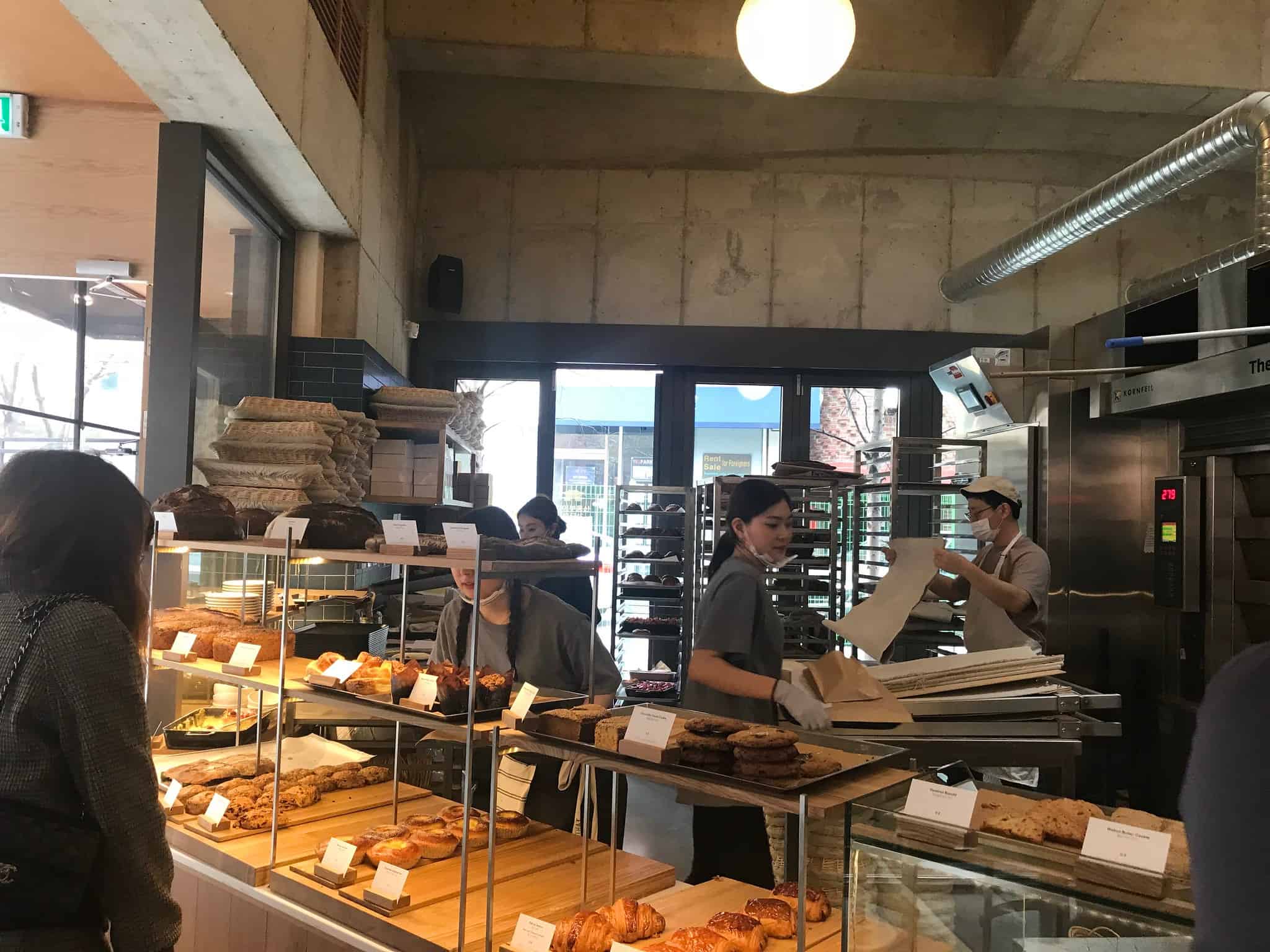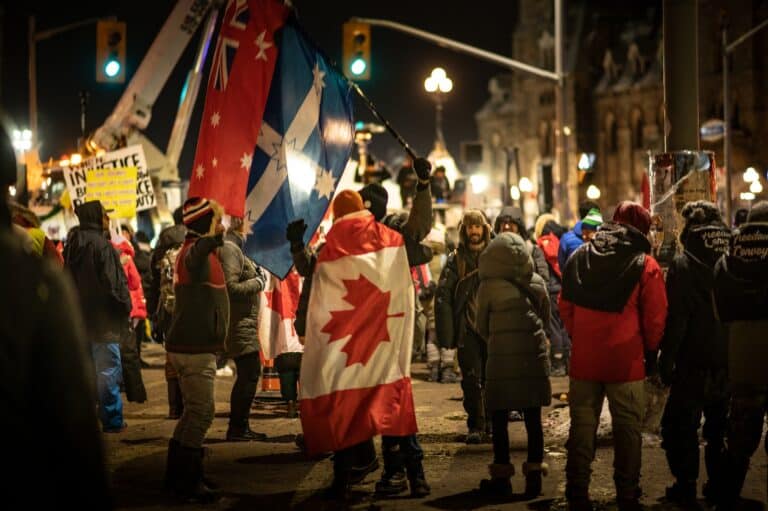
Marina Multhaup is a Senior Associate at Barnard, Iglitzin & Lavitt—a law firm in Seattle, Washington, that represents unions, and a former student member of the Labor and Employment Lab at Harvard Law.
On February 6th, 2020, 146 bakers, dishwashers, prep cooks, servers, bussers, and baristas announced their intention to unionize Tartine Bakery in California. On March 13th they voted. Three days later the U.S. shut down and all of their organizing and efforts were thrown into question. 377 days later the NLRB announced that the union had won the election. What was it like to organize through a pandemic? How has the past year of lockdown, fear, lay-offs, and precarity affected fledgling organizing efforts? I spoke to two worker-organizers with the Tartine Union drive to find out.
Tartine Bakery was started in 2002 in San Francisco by Elizabeth Prueitt and Chad Robertson in a single San Francisco location. Today Tartine has thirteen locations stretching from San Francisco to Seoul. The bakery makes award-winning bread and promotes a certain ethos: its Instagram is filled with warm-toned visions of baked goods and perfectly manicured sandwiches. Its founders go surfing, pose for pictures in their trendy white-cupboarded kitchen, and ask open-ended questions like, “what if a bakery kept its heart and soul, but always remained open to new ideas?” Tartine’s workers, however, report that success at the top did not translate into success for workers. Workers reported unlivable wages, cuts to their healthcare, increasing use of part-time workers, and no paths for advancement. So in February 2020 146 workers at five different Tartine Bay Area locations, inspired by a successful organizing drive a year prior at Anchor Brewing, announced that they were unionizing with the ILWU.
Tartine Bakery workers began their union drive with the odds stacked against them. Restaurants have the lowest unionization rate of any sector– less than 2%. Food service workers are some of the most precariously positioned workers in our economy today—and the pandemic has only exacerbated their vulnerability. Compared to similar workers in other industries restaurant workers make less pay, have higher rates of poverty, are more likely to be women and people of color and are drastically less likely to have health or retirement insurance.
Instead of voluntarily recognizing the union, Tartine management hired Cruz & Associates, the same union-busting firm that was paid half a million dollars to bust the 2015 unionization effort at Trump International Hotel. In February and early March 2020 Tartine workers were subjected to an intense and relentless anti-union campaign, with weekly captive audience meetings where Cruz & Associates would isolate monolingual Spanish speaking workers, without witnesses, and spread misinformation about the union. Emily Haddad, who worked as a barista for two years at Tartine, described the anti-union campaign as “traumatic,” “insidious,” and “divisive.” Another worker-organizer Kaela Sanborm-Hum said that Tartine’s “clearly racialized way of treating workers” created fear and confusion at work.
In response to the intense union-busting efforts, the organizing committee organized even harder. They organized people to call management and complain about the union-busting, they secured local support from supervisors and city council members, they held press conferences, made buttons and stickers, held rallies, organized email campaigns and in-person protests. Going into the official vote, the Tartine union effort had built momentum, community support, and solidarity. On March 12, 2020 the San Francisco locations voted, on March 13, 2020 the Berkeley location voted. The Berkeley location, which had not been subjected to captive audience meetings, voted unanimously to join the union. The San Francisco locations voted to unionize but it was close. Immediately ballots were challenged, and the official result of the election remained unknown. Three days later, San Francisco shut down.
Tartine management responded by temporarily laying off all of its workers. The Tartine Union, on the other hand, immediately jumped to the aid of their co-workers. The same day that the stay-at-home order went into effect the Tartine Union organized a hardship relief fund for their co-workers, prioritizing their colleagues with family and health issues. I asked Kaela and Emily what it was like to have their months-long organizing effort shut down overnight. Kaela said that it was really abrupt and initially shocking, but that doing the relief fund was “instrumental to remembering solidarity and connection with each other, knowing that it wasn’t just rhetoric, [that] we actually had each others’ backs.” Emily said that organizing the relief fund actually helped bring some skeptics to the union side: “so many people that were not stoked on the union because of the union-busting rhetoric got stoked on the union because we were the ones that were helping them feed their families, when their bosses had completely abandoned them after telling them repeatedly for six weeks that they were family.”
Next, the Tartine Union circulated a petition demanding that management hire back all of its laid-off workers when business resumed. When Tartine permanently closed its Berkeley location in April, the union asked Tartine management to add those Berkeley workers to the recall list. Management declined. The Union then worked with the San Francisco Board of Supervisors to successfully pass the Back-to-Work Emergency Ordinance which provided a right to reemployment for employees that were laid-off due to covid. Though the Ordinance helped thousands of other San Franciscans return to their jobs, Tartine has argued that it does not apply to them.
It took a full year for the NLRB to certify the Tartine Union’s election. Part of that was due to covid, but the year-long wait isn’t abnormal under current labor laws. Management and the union challenged ballots, leading to weeks of “grueling litigation” in June. In October a regional board ruled on the ballots but Tartine management appealed the decision all the way to the DC Board, which rejected the appeal on March 19, 2021. On March 31st the last ten votes were unsealed which pushed the union to a 93-90 victory. A year and a pandemic later, the union won.
Neither Emily nor Kaela work at Tartine anymore. No one who had been pro-union was hired back, Emily reports. (If true this is a potential violation of federal labor law.) I asked them what it meant to have won the union vote a year later after so much upheaval– “Is it even a win?” “Honestly to me, it feels like a victory,” Emily said, “it feels like a moral victory. Like David beat Goliath. These people [Tartine management] spent that much money, time, and energy, and the workers still won, how amazing is that?” Kaela agreed and emphasized that it will benefit future Tartine workers. “What matters,” she said, “is that it sets a new standard in San Francisco and in the Bay. Workers are seeing this and are feeling empowered to do this at their workplace.” The Tartine Union hasn’t publicized its next moves, but said that they “hope to work with Tartine in good faith moving forward.”
The day after the NLRB finally declared that the Tartine union had won, Emily, Kaela, and their other former coworkers gathered in Dolores Park in solidarity with the next restaurant union drive. Inspired by the Tartine Union, food service workers at nearby Dandelion chocolate have started their own union drive with the ILWU. “A labor wave is happening,” Emily said, “and it feels great.”










Daily News & Commentary
Start your day with our roundup of the latest labor developments. See all
June 29
In today’s news and commentary, Trump v. CASA restricts nationwide injunctions, a preliminary injunction continues to stop DOL from shutting down Job Corps, and the minimum wage is set to rise in multiple cities and states. On Friday, the Supreme Court held in Trump v. CASA that universal injunctions “likely exceed the equitable authority that […]
June 27
Labor's role in Zohran Mamdani's victory; DHS funding amendment aims to expand guest worker programs; COSELL submission deadline rapidly approaching
June 26
A district judge issues a preliminary injunction blocking agencies from implementing Trump’s executive order eliminating collective bargaining for federal workers; workers organize for the reinstatement of two doctors who were put on administrative leave after union activity; and Lamont vetoes unemployment benefits for striking workers.
June 25
Some circuits show less deference to NLRB; 3d Cir. affirms return to broader concerted activity definition; changes to federal workforce excluded from One Big Beautiful Bill.
June 24
In today’s news and commentary, the DOL proposes new wage and hour rules, Ford warns of EV battery manufacturing trouble, and California reaches an agreement to delay an in-person work mandate for state employees. The Trump Administration’s Department of Labor has advanced a series of proposals to update federal wage and hour rules. First, the […]
June 23
Supreme Court interprets ADA; Department of Labor effectively kills Biden-era regulation; NYC announces new wages for rideshare drivers.